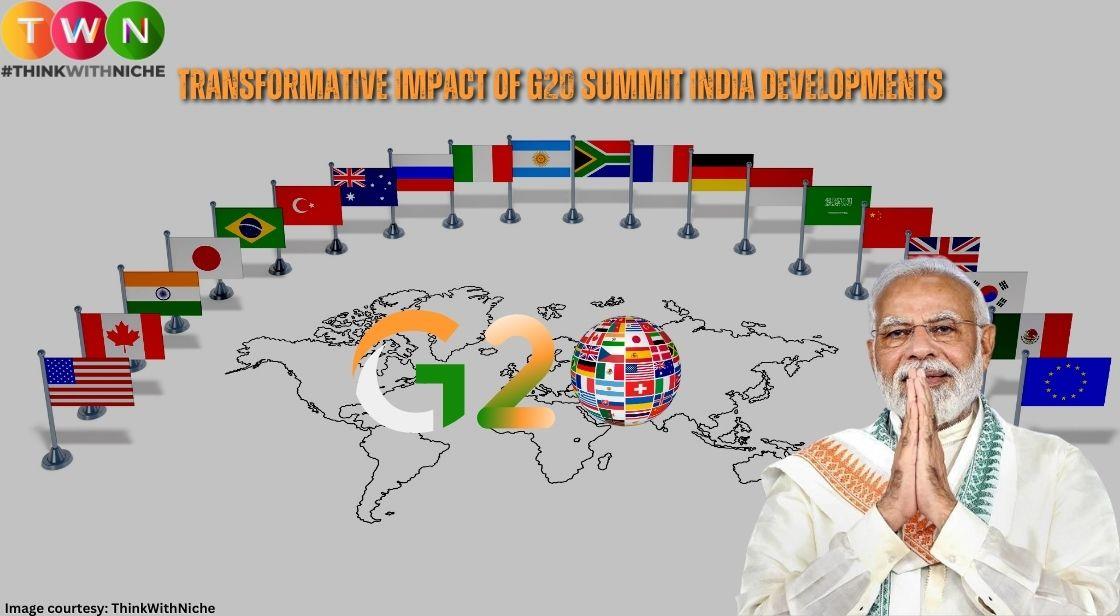Transformative Impact Of G20 Summit India Developments

Blog Post
The G20 Summit is a major international event in which the leaders of the world's major economies come together to discuss global economic issues. It is an opportunity to address the challenges facing the global economy and to create an environment of economic stability and growth. This event has the potential to transform the global economy, and it is important to understand the developments that have come out of it. As India's G20 presidency began on December 1, 2022, Prime Minister Narendra Modi set the tone for the country's presidency by focusing on the profound spiritual foundations of Indian philosophy and calling for a paradigm shift that focuses on human-centric globalization. In this article, we will explore the impact of the G20 Summit India Development Agenda along with its theme, Priorities and Possible Impact on the Global economy, and some other major aspects.
Blog Flow:
- History of G20 Summit
- The Theme of India's G20 Presidency
- What are India's G20 priorities?
- Overview of the G20 Summit India Development Agenda
- India’s G20 Agenda
- Five key components of G20 Summit India Development Agenda
- Benefits of the G20 Summit India Development Agenda
- Possible Challenges of G20 Summit India Development Agenda
- What Means The G20 for Modi and India?
- Impact of the G20 Summit India Development on the Global Economy
On December 1, 2022, India took over the G20 Presidency from Indonesia and will host the G20 Leaders' Summit for the first time in the country in 2023. A nation deeply committed to democracy and multilateralism, India's G20 Presidency would be a watershed moment in her history as it seeks to play an important role by finding pragmatic global solutions for the wellbeing of all, and in doing so, manifest the true spirit of 'Vasudhaiva Kutumbakam' or the 'World is One Family'.
The G20 Summit provides an opportunity for global economic leaders to come together and discuss issues that are impacting the global economy, such as trade, investment, financial stability and global development. The goal of the Summit is to create an environment of economic stability and growth around the world. At the G20 Summit India 2022, the leaders discussed a variety of topics, including the global economic outlook, climate change, digitalization, and the role of technology in creating a more sustainable future. The Summit also saw the launch of the G20 Summit India Development Agenda, which is a set of measures designed to promote economic growth and development around the world. This agenda is aimed at addressing the challenges facing the global economy and helping to create an environment of economic stability and growth.
History of G20 Summit
Following the Asian financial crisis, the G20 was formed in 1999 as a forum for Finance Ministers and Central Bank Governors to discuss global economic and financial concerns. Following the global economic and financial crisis of 2007, it was elevated to the level of Heads of State/Government, and it was declared the "primary forum for international economic cooperation" in 2009.
The Theme of India's G20 presidency
The theme of India's G20 presidency, "Vasudhaiva Kutumbakam," or "One Earth, One Family, One Future," is taken from Maha Upanishad, an ancient Sanskrit literature. The idea essentially emphasises the importance of all life - human, animal, plant, and microorganism - and their interconnectedness on Earth and in the larger world. The topic also emphasises LiFE (Lifestyle for Environment), with its associated environmentally sustainable and responsible choices, both at the individual lifestyle and national development levels, leading to globally transformative activities that result in a cleaner, greener, and bluer future.
What are India's G20 priorities?
1. Green Development, Climate Finance, and Life
The opportunity to lead the G20 comes at a time when existential threats are mounting, with the COVID-19 pandemic exposing the fragility of our systems under the cascading effects of climate change. Climate change is a crucial concern for India's presidential Presidency in this regard, with a particular emphasis on not only climate, finance and technology, but also on guaranteeing just energy transitions for developing nations worldwide.
Recognizing that climate change affects industry, society, and sectors, India offers the world LiFE (Lifestyle for Environment) - a behavior-based movement that draws on our country's rich, ancient sustainable traditions to nudge consumers, and thus markets, to adopt environmentally conscious practises. This is strongly related to India's G20 theme, 'Vasudhaiva Kutumbakam,' or 'One Earth. One Family. One Future.
2. Accelerated, Inclusive, and Resilient Growth
Accelerated, resilient, and inclusive growth is essential for long-term development. India intends to focus its G20 presidency on sectors with the potential to achieve structural transformation. This includes a desire to accelerate MSMEs' inclusion into global commerce, instil the spirit of trade for growth, promote labour rights and secure labour welfare, close the global skills gap, and establish inclusive agriculture value chains and food systems, among other things.
3. Accelerating progress on SDGs
Accelerating SDG Progress India's G20 Presidency aligns with the important point of the 2030 Agenda. As a result, India recognises the negative impact of COVID-19, which has turned the current decade of action into a decade of recovery. In accordance with this perspective,
India wants to recommit the G20 to meet the targets outlined in the 2030 Agenda for Sustainable Development.
4. Transformation of Technology and Digital Public Infrastructure
As the G20 Presidency, India may highlight its belief in a human-centric approach to technology and foster increased knowledge-sharing in important areas such as digital public infrastructure, financial inclusion, and tech-enabled development in sectors ranging from agriculture to education.
5. Multilateral Institutions in the 21st Century
India's G20 objective would be to continue pushing for reformed multilateralism that generates a more accountable, inclusive, just, egalitarian, and representative multipolar international structure appropriate for solving 21st-century challenges.
6. Development led by women
India intends to use the G20 summit to emphasise inclusive growth and development, with women's empowerment and representation at the forefront of India's G20 deliberations. This involves an emphasis on bringing women to the front and in positions of leadership in order to improve socio-economic growth and SDG achievement.
7. Overview of the G20 Summit India Development Agenda
The G20 Summit India Development Agenda is a comprehensive package of measures aimed at promoting economic growth and development around the world. This agenda includes measures to promote financial inclusion, reduce poverty, promote job creation and economic growth, and foster sustainable development.
India’s G20 Agenda
In defining the country's strategy for the G20, Indian Prime Minister Narendra Modi has called for international cooperation to deal with global concerns.
He added in a statement the issues of "climate change, terrorism, and pandemics can be overcome not by battling each other, instead by acting together".
Modi also stressed a need to "depoliticise the global supply of food, fertilisers and medical products, so that geo-political tensions do not lead to humanitarian crises".
His statement underscores New Delhi's position that the Ukrainian conflict, sparked by a Russian invasion in February, must be addressed via dialogue and diplomacy.
Five key components of G20 Summit India Development Agenda
-
Financial inclusion: The G20 Summit India Development Agenda focuses on promoting financial inclusion and expanding access to financial services for all. This includes measures to ensure that access to financial services is not limited by barriers such as gender, race, or geography.
-
Poverty reduction: The G20 Summit India Development Agenda seeks to reduce poverty through measures such as improving access to education and healthcare, creating job opportunities, and promoting entrepreneurship.
-
Job creation: The G20 Summit India Development Agenda seeks to create jobs through measures such as encouraging investment in infrastructure, promoting technology and innovation, and providing incentives for businesses.
-
Economic growth: The G20 Summit India Development Agenda seeks to promote economic growth through measures such as promoting trade and investment, providing access to finance, and implementing structural reforms.
-
Sustainable development: The G20 Summit India Development Agenda seeks to promote sustainable development through measures such as promoting renewable energy, promoting responsible resource management, and ensuring access to clean water and sanitation.
Benefits of the G20 Summit India Development Agenda
The G20 Summit India Development Agenda has the potential to bring about significant positive changes to the global economy. The agenda seeks to promote economic growth and development, reduce poverty, and foster sustainable development.
The agenda also seeks to promote financial inclusion by providing access to financial services for all, regardless of gender, race, or geography. This is important as access to financial services is critical for economic growth and development.
The agenda also seeks to create jobs by encouraging investment in infrastructure, promoting technology and innovation, and providing incentives for businesses. This is important as job creation is essential for economic growth and development.
The agenda also seeks to promote sustainable development by promoting renewable energy, promoting responsible resource management, and ensuring access to clean water and sanitation. This is important as sustainable development is essential for economic growth and development.
Possible Challenges of G20 Summit India Development Agenda
Although the G20 Summit India Development Agenda has the potential to bring about positive changes to the global economy, there are several challenges that need to be addressed.
One of the major challenges is the lack of funding for the implementation of the agenda. Although the G20 Summit India Development Agenda seeks to promote economic growth and development, it is costly to implement and there is a lack of funds to finance the agenda.
Another challenge is the lack of political will to implement the agenda. Although the G20 Summit India Development Agenda seeks to promote economic growth and development, many countries are not willing to implement the agenda due to political and economic interests.
Finally, there is the challenge of implementation. Although the G20 Summit India Development Agenda seeks to promote economic growth and development, it is difficult to implement the agenda due to the complexity of the global economy and the lack of coordination between countries.
What Means The G20 for Modi and India?
The summit's timing, ahead of India's general elections in 2024, might enhance Modi's already increased household reputation as a leader in the world.
Many of his G20 predecessors, notably US President Joe Biden and French President Emmanuel Macron, appear to have a personal chemistry with the 72-year-old leader. Nonetheless, the current complex geopolitical and economic circumstances will make shaping the international response to several crises difficult for India and Modi.
Impact of the G20 Summit India Development on the Global Economy
The G20 Summit India Development Agenda has the potential to bring about positive changes to the global economy. The agenda seeks to promote economic growth and development, reduce poverty, and foster sustainable development.
The agenda also seeks to promote financial inclusion by providing access to financial services for all, regardless of gender, race, or geography. This is important as access to financial services is critical for economic growth and development.
The agenda also seeks to create jobs by encouraging investment in infrastructure, promoting technology and innovation, and providing incentives for businesses. This is important as job creation is essential for economic growth and development.
Finally, the agenda also seeks to promote sustainable development by promoting renewable energy, promoting responsible resource management, and ensuring access to clean water and sanitation. This is important as sustainable development is essential for economic growth and development.
Overall, the G20 Summit India Development Agenda has the potential to bring about significant positive changes to the global economy and to promote economic growth and development around the world.
Conclusion
The G20 Summit India Development Agenda has the potential to bring about significant positive changes to the global economy. The agenda seeks to promote economic growth and development, reduce poverty, and foster sustainable development. It also seeks to promote financial inclusion, create jobs, and promote sustainable development.
However, there are several challenges that need to be addressed, such as the lack of funding and political will to implement the agenda. Nevertheless, if implemented properly, the G20 Summit India Development Agenda has the potential to bring about significant positive changes to businesses, financial markets, technology, and society around the world.
You May Like
EDITOR’S CHOICE












